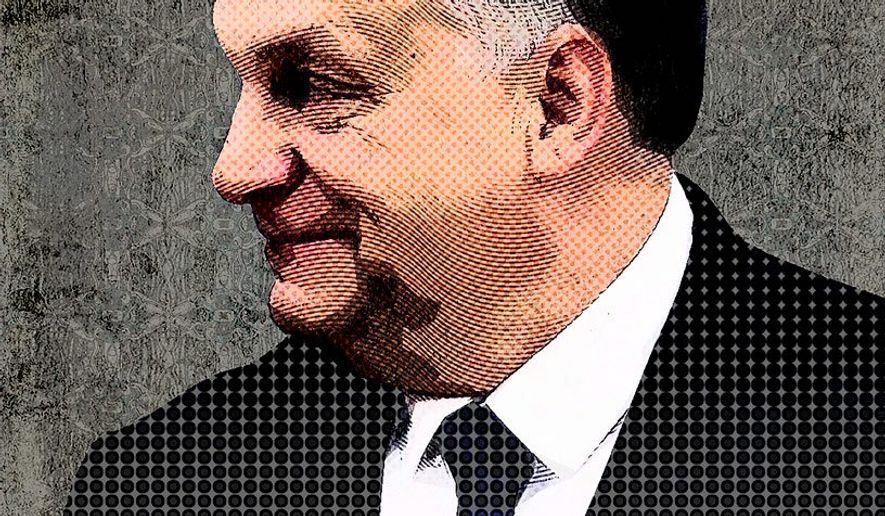OPINION:
The Hungarian government recently announced that President Trump and Prime Minister Viktor Orban will soon meet in Washington, D.C. The visit will mark the end of a decade-long period of high-level diplomatic isolation of Hungary. The meeting is widely applauded by friends of Hungary, like myself, who hold that keeping our allies close should be a prime strategic goal of U.S. foreign policy.
During the Obama years, countries in Central and Eastern Europe rightfully felt neglected, while the U.S. administration’s efforts to reset relations with Russia overwrote long-standing friendships America had cultivated on Europe’s edge. U.S. meddling in Hungary’s domestic affairs and its criticism without engagement left a deep scar on bilateral relations.
I heard time and time again from Hungarians that it was virtually impossible to get high-level meetings at the White House, National Security Council or the State Department — hardly the mark of smart U.S. diplomacy, particularly when a resurgent Russia was invading countries in Eastern Europe, and both China and Russia were swarming into the region unchallenged. Open channels of communication are the bedrock of effective diplomacy, even where there are differences.
The Trump administration was right to discontinue the reset with Russia, rethink U.S. policy toward Hungary and the region, and take great power competition seriously. It took the bold leadership of Secretary of State Mike Pompeo to break with almost a decade of failed policy. And it took the grit and intellectual gravitas of a handful who knew the region well to mend relations with some of America’s most crucial but fragile allies.
The policy shift is timely. Russia’s abuse in using its Soviet-era energy dominance and its intrusive propaganda combined with China’s aggressive investments were leaving America with less and less influence in a region that has been a bastion of Atlanticism since its countries joined NATO 20 years ago.
Count Gyula Andrassy, Hungary’s 19th-century foreign minister, once said that “It is always better to be sure that we cannot be harmed, than to assume that no one wants to harm us.” And indeed, the military-to-military cooperation has been the backbone of the relationship between Hungary and the United States. It continues to be wise diplomacy for America to focus on expanding that cooperation.
Hungary’s Armed Forces Development Program resulted in a commitment to increased defense spending, a key Trump administration goal. Significantly, the two countries just signed a landmark Defense Cooperation Agreement, a key priority for the United States and NATO, which will facilitate troop mobilization in Europe. Budapest is also increasing the number of Hungarian troops serving in the Western Balkans, and in Kosovo, Iraq and Afghanistan.
Hungary now co-leads the NATO Baltic Air Policing detachment. And Hungary’s Papa Airbase, which I assisted in activating in 2009, remains critical to supplying far-flung NATO operations.
Ahead of Mr. Orban’s visit, Hungary is also in intense negotiations to upgrade its air defense system and conclude a high-value arms deal with the United States to modernize its military, a critical strategic goal.
Capitalizing on a New American Energy Era, Energy Secretary Rick Perry has been touting the geostrategic benefits of U.S. liquefied natural gas exports — U.S. LNG can contribute meaningfully to increasing energy security by eliminating Russia’s monopolistic position. Budapest is making clear strides in lowering energy risk. It has increased its domestic storage capacity, expanded gas pipeline interconnectors with neighbors and pushed for energy diversification to facilitate the importation of natural gas — including U.S. LNG — from new sources in Romania and Croatia.
On the trade front, China’s Belt and Road Initiative is an alarmingly appealing alternative to countries like Hungary. The Trump administration is right to be more forceful in economic and trade diplomacy toward Hungary and could hardly find a better partner for this than Hungary’s business savvy foreign minister, Peter Szijjarto, who flies back and forth between Washington and Budapest almost every other month.
Partly thanks to these efforts, the United States is still the largest non-EU investor in the country, providing more than 100,000 jobs for highly skilled Hungarians and more than 15 percent of all foreign investment. Job-creating investments like the recently negotiated Hungary-Ohio Economic Cooperation Agreement is a win-win for both countries.
There’s a plethora of foreign policy issues the Trump administration and Budapest agree on, from strong and unapologetic support for Israel to assisting persecuted communities of Christians in the Middle East. Hungary is in lockstep with Washington on policy toward Venezuela, North Korea and the Euro-Atlantic integration of the Western Balkans. There is also strong agreement on the fundamental importance of border security and international migration, an issue that challenges both Europe and the United States.
Whether one agrees or disagrees with the brand of politics of Donald Trump or Viktor Orban is secondary. What matters first and foremost is the strength and the resilience of our alliance in the face of adversarial forces. And from this perspective, the upcoming TrumpOrban meeting is a major step forward.
• April H. Foley was United States ambassador to Hungary and currently serves as chairman of the Board of the Hungary Initiatives Foundation, a Washington-based cultural and education nonprofit.




Please read our comment policy before commenting.